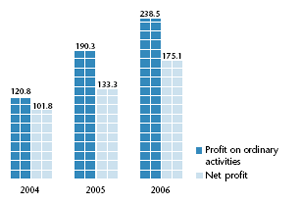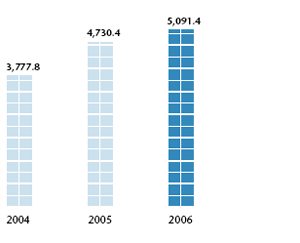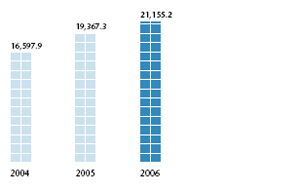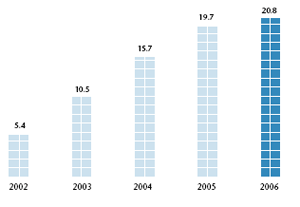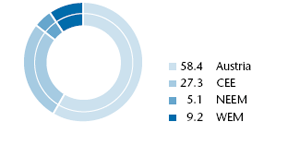  | |||||||||||||||||||||||||||||||||||||||||||||||||||||||||||||||||
 | |||||||||||||||||||||||||||||||||||||||||||||||||||||||||||||||||
Path: Home Group Management Report Group Management Report Group business development Group business development | |||||||||||||||||||||||||||||||||||||||||||||||||||||||||||||||||
| Group business developmentBusiness activityThe UNIQA Group provides life and health insurance, and is active in almost all lines of property and casualty insurance. The Group holding company, UNIQA Versicherungen AG, conducts the indirect business for the Group. In addition, it carries out numerous service functions for the Austrian and international insurance subsidiaries, in order to take best advantage of synergy effects within all the Group companies, and to consistently implement the Group’s long-term corporate strategy. With over 12.5 million insurance policies being managed at home and abroad, a gross premium volume written of € 5.1 billion (2005: € 4.7 billion) and capital investment of more than € 21 billion (2005: € 19.4 billion), the UNIQA Group is one of the leading insurance groups in Central and Eastern Europe. In 2006, 42.5% of premium volume came from life insurance (2005: 41.3%), 17.5% from health insurance (2005: 17.9%) and 40.0% from property and casualty insurance (2005: 40.9%). Group pre-tax results reached e 238.5 millionIn the 2006 financial year, the UNIQA Group was able to further improve its profits and earned a profit that was 25.3% higher than the profit on ordinary activities, which amounted to € 238.5 million (2005: € 190.3 million). Sales profitability could be increased in 2006 to 5.8% (2005: 4.8%). Details on the consolidated and associated companies can be found in the corresponding overview in the Group notes (cf. Group companies). The accounting and valuation methods used as well as the changes in the scope of consolidation are also explained in the Group notes. Risk reportThe comprehensive risk report of the UNIQA Group is in the notes to the consolidated financial statement 2006 (cf. notes, p. 86 ff). UNIQA Group business developmentThe following comments to the business development are divided into two sections. The section “Group business development” describes the business performance from the perspective of the Group with fully consolidated amounts. The business trends in life, health and property and casualty insurance are discussed in the segment reports. For the first time, the 2006 Group management report is also geared to the fully consolidated amounts. The figures for the previous year have been adjusted accordingly.
Premium volume climbed to over e 5 billion in 2006The UNIQA Group’s consolidated premiums written rose in 2006, by 3.7% to € 4,532.1 million (2005: € 4,370.2 million). If one also considers the savings portion of premiums from unitand index-linked life insurance in the amount of € 559.3 million (2005: € 360.2 million), the total premium volume grew by 7.6% to € 5,091.4 million (2005: € 4,730.4 million). The retained Group premiums earned grew by 3.2% to € 4,129.7 million (2005: € 4,000.4 million).
In Austria, premium volume written incl. the savings portion of premiums from unit- and index-linked life insurance increased in 2006, by 1.0% to € 3,420.5 million (2005: € 3,385.6 million). The reasons for this moderate growth were the high expirations in the area of bank sales and the reduction in single- premium business in life insurance. Furthermore, the loss of recurring premiums from policies with abbreviated premium payment periods put a burden on the development of premiums. Premiums earned in Austria in 2006 amounted to € 2,916.3 million (2005: € 2,917.0 million). In the growth regions of Eastern and South-Eastern Europe (CEE & NEEM) the premiums developed noticeably faster in 2006. Premium volume written including the savings portion of premiums >from unit- and index-linked life insurance increased in 2006, by 32.7% to € 639.8 million (2005: € 482.2 million). This put the share of Group premiums coming from CEE & NEEM at 12.6% (2005: 10.2%). The premiums earned rose by 20.2% to € 523.5 million (2005: € 435.4 million). In the Western European Markets (WEM) the premium volume written also rose by 19.5% to € 1,031.1 million (2005: € 862.6 million). This corresponded to a share in the Group premiums of 20.3% (2005: 18.2%). Earned premium income in the companies in Germany, Switzerland, Liechtenstein and Italy increased by 6.5% to € 689.8 million (2005: € 648.0 million). Development of insurance benefitsThe consolidated retained insurance benefits decreased in the 2006 financial year, despite the rise in premiums by a total of 1.6% to € 3,715.6 million (2005: € 3,776.9 million). In Austria, UNIQA was even able to decrease insurance benefits by an impressive 5.2% to € 2,807.4 million (2005: € 2,960.3 million). In the CEE & NEEM regions, because there was a rise in premium volume, the insurance benefits were also higher. They increased by 16.5% to € 325.6 million (2005: € 279.5 million). In Western Europe insurance benefits grew by 8.5% to € 582.7 million (2005: € 537.1 million). Development of operating expensesTotal consolidated operating expenses (cf. Group notes, no. 36) less reinsurance commissions and profit shares from reinsurance business ceded (cf. Group notes, no. 32) increased only slightly in the 2006 financial year, despite the increase in the number of companies to be consolidated and the rise in premiums, by 4.2% to € 966.9 million (2005: € 927.7 million). Acquisition expenses incl. the change in the deferred acquisition costs and less the reinsurance commissions received rose by 8.4% to € 627.6 million (2005: € 579.1). Other operating expenses decreased in comparison to the previous year due to successful cost reduction measures as part of the 2004–2006 profit improvement plan by 2.7%, from € 348.7 million to € 339.4 million. The cost ratio of the UNIQA Group, i.e. the relation of total operating expenses to the Group premiums earned, including the savings portion of premiums from unit- and index-linked life insurance, decreased in 2006 to 20.9% (2004: 21.5%). The administrative cost ratio sank even more, coming to 7.3% at the end of the year (2005 8.1%). Investment portfolio exceeded e 21 billion
Total investments incl. land and buildings used by the Group, real estate held as investments, shares in associates and investments in unit-linked and index-linked life insurance increased in the reporting year by € 1,787.8 million or 9.2% to € 21,155.2 million (2005: € 19,367.3 million). Net investment income less financing costs sank by 10.2% to € 865.0 million (2005: € 962.9 million). In 2005, UNIQA recorded an unusually high level of realised capital gains that was used to compensate the additional provisions needed for retirement annuities due to the adjustment of the Austrian mortality tables. In 2006, the performance of the stock markets was slightly weaker compared to the years before and this, together with the rising interest-rate environment, were additional reasons why the investment results were lower. Nevertheless, a solid profit could be made over the past year due to the broad distribution of asset investments and the use of alternative investment instruments. A detailed description of the investment income can be found in the notes to the financial statements. (cf. note no. 33). Own funds and total assets
The UNIQA Group’s total equity increased in 2006, by € 196.1 million to € 1,329.8 million (2005: € 1.133.7 million). This included minority interests amounting to € 207.3 million (2005: € 203.2 million). The pre-tax return on equity – the ratio of profit on ordinary activities to average total equity (without taking into consideration the included net profit for 2006) amounted to 20.8% in the past financial year ( 2005: 19.7%). In light of the obvious growth of the Group, UNIQA Versicherungen AG issued subordinated debt amounting to € 250 million to further strengthen own funds, that was placed in December 2006 and early 2007 in two tranches. The total assets of the Group increased in the past financial year, by 8.9% and totalled € 24,587.1 million (2005: € 22,568.4 million) on 31 December 2006. Cash flowThe cash flow from operating activities increased by 136.0% to € 1,237.0 million (2005: € 524.1 million) in 2006. Cash flow from investing activities of the UNIQA Group amounted to € –1,280.4 million (2005: € –799.7 million). There was an outflow of cash due to the acquisition of companies of € –159.8 million (2005: –69.5 million). The financing cash flow remained stable due to the issuance of subordinate capital, and came to € 100.7 million (2005: € 104.4 million). A total of € 31.1 million were spent on the dividends from the 2005 financial year. The amount of liquid funds changed in total by € 71.1 million (2005: € –163.3 million). At the end of 2006, funds amounting to € 263.2 million (2005: € 192.0 million) were available. StaffThe average number of employees in the UNIQA Group increased in the 2006 financial year to 10,748 (2005: 9,943 employees). Of these, 3,957 (2005: 3,469) were in sales (employed sales force) and 6,791 (2005: 6,474) were in administration. In the New Eastern Emerging Markets (NEEM) UNIQA employed a staff of 547 in 2006 (2005: 0), 2,930 people (2005: 2,800) in Central Eastern Europe (CEE) and 989 (2005: 968) in the Western European Markets (WEM). In Austria, 6,282 people were employed (2005: 6,175). This corresponded to a share 58.4%
Half of the staff employed in administration in Austria in the past year were women, 17.6% of the employees were working part time. The average age in 2006 was 43 years. In total, 11.1% of the employees participated in UNIQA’s result-oriented remuneration system – a variable payment system that is tied both to the success of the company and to personal performance. In addition, the new UNIQA apprentice exchange programme offers young people in training the opportunity to get to know foreign cultures and make international contacts. The productivity of UNIQA’s employees continued to rise in the past financial year as well – the income before taxes per employee in 2006 came to € 22,190 (2005: € 19,139). |
 | |||||||||||||||||||||||||||||||||||||||||||||||||||||||||||||||
 | |||||||||||||||||||||||||||||||||||||||||||||||||||||||||||||||||
| © 2007 by UNIQA Versicherungen AG |
| ||||||||||||||||||||||||||||||||||||||||||||||||||||||||||||||||
 Content
Content Topics
Topics Search
Search
